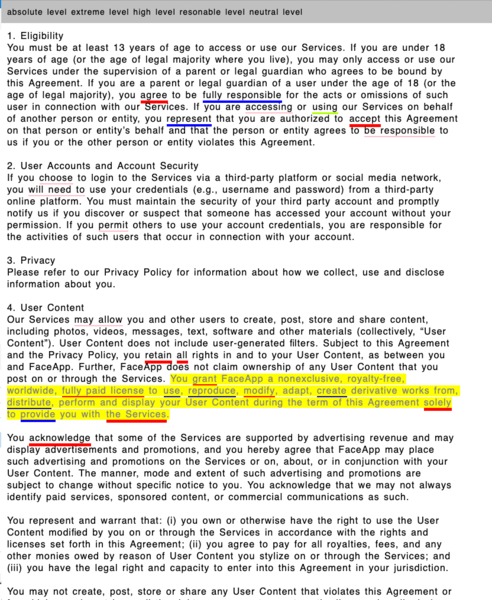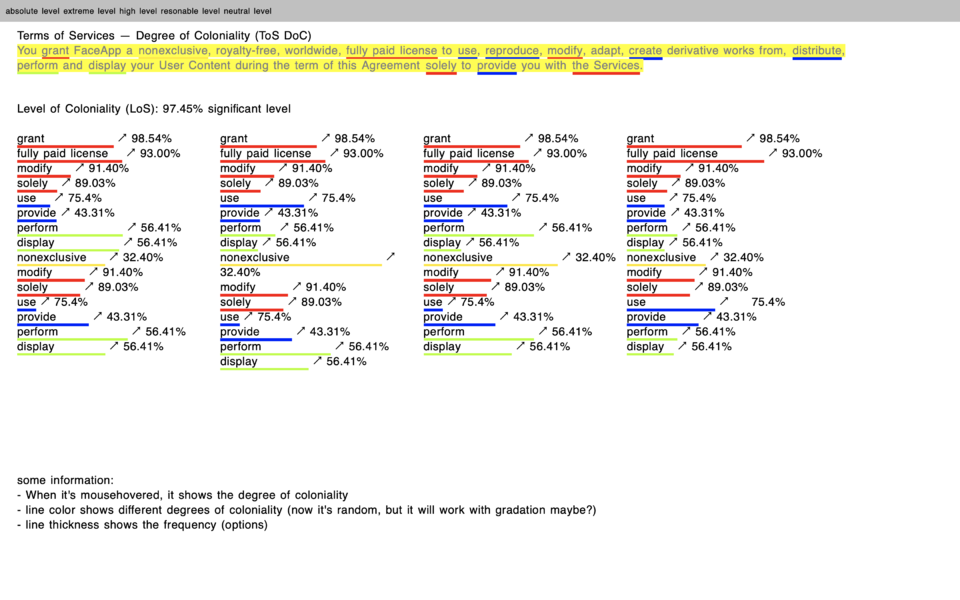User:Bohye Woo/Degrees of colonially in Terms of Service
DoCiToS
DoCiToS (Degrees of Coloniality in Terms of Service) is a modern-colonial publishing archive, a series of numerical analysis that reveal the colonial contexts in 'Terms of Service (ToS)'. ToS is a modern working contract in digital colonial society, where big companies are dominating the power structures via ToS to deceive users. The project develops the colonization of metrics by measuring how colonized particular terms are being used in ToS.
The role of DoCiToS
DoCiToS...
- introduces how modern digital colonialism is showing in digital society by mapping out the whole colonial architecture of Terms of Service.
- archives news articles, videos, books, tweets ... to proffer knowledges related with the project.
- provides a basic analysis on each web platforms by using 'MediaWiki' to store information.
- collects Terms of Services from major websites to investigate the degrees of coloniality: every platform has different tones of coloniality, different words being used. To what extent does the platforms have coloniality in ToS?
- measure the degrees of coloniality: I specifically focus on measuring words within the realm of ToS. I narrow down the context to that of ToS to prevent generalizing the measurement.
- develops colonial language into colonial glossary.
- annotates numerical datas on analyzing the colonial context of ToS.
Importance of language
Language is important because:
- Language as a colonial tool: Treaties in colonial times and Terms of Service in modern time both are to control the power structure. it shows a way to indoctrinate/manipulate the colonize subject via ToS.
- Polarity of calming language: how specific words can play as colonial words: Using their comfort language become a colonial language. Comforting language for the company that are using highly polarized terms sometimes obfuscates or conceal users labour to deceive them.
- Language as a colonial waterway: Shiproute in colonial times that used to sail to exchange/extract/export the goods. Language itself as a medium by which to interface with the colonizer.
A list of Terms of Services
These companies are officially not a colony, but in a pratical term: a colony. There is a relationship that is unfair regardless what their intention is.
PokemonGo: https://www.pokemon.com/us/privacy-notice/
TikTok: https://www.tiktok.com/legal/privacy-policy?lang=cn#privacy-row
Snapchat
FaceApp
Netflix
Amazon
FaceBook
Instagram
Sony - Aibo: https://us.aibo.com/terms/aibo-privacy.html
FaceApp: https://www.faceapp.com/privacy-en.html / https://www.faceapp.com/terms-en.html
How to categorise colonial words?
STEP 1
Using a Standford Log-linear Part-Of-Speech Tagger in NLTK. A Part-Of-Speech Tagger (POS Tagger) is a piece of software that reads text in some language and assigns parts of speech to each word (and other token), such as noun, verb, adjective, etc. (https://nlp.stanford.edu/software/tagger.shtml)
The list of part of speech
- MD = would, could...
- RB = adverb 'very', 'slightly'...
- VB = verb
- JJ = adjective 'big'...
- NN = noun
- CC = coordinating conjunction 'and', 'or'...
- PRP = personal pronoun 'I', 'he', 'she'...
... more and more
STEP 2
When it's first categorized, I will establish sub-categories into the degree of coloniality.
degree of coloniality (gradation of intensity words)
100.00 = absolute level of coloniality
90.00 = extreme level of coloniality
80.00 = heavy level of coloniality
70.00 = high level of coloniality
60.00 = significant level of coloniality
50.00 =
40.00 = relative level of coloniality
30.00 = moderate level of coloniality
20.00 = reasonable level of coloniality
10.00 = fair level of coloniality
0.00 = neutral level of coloniality
Example
epistemic_VB = { #verbs from FaceApp ToS
100.00: d("must", "agree","use"),
90.00: d("use", "bound", "access", "allow", "acknowlegde", "reproduce"),
80.00: d("choose","claim", "permit", "collect" ),
70.00: d("change", ),
60.00: d("create"),
50.00: d(),
40.00: d("maintain"),
30.00: d("support"),
20.00: d("identify"),
10.00: d("may"),
0.00: d(),
}
How to publish/archive?
Archive will contain different analyzations on the colonial words and context including
- rankings of the colonial words in different platform's ToS,
- the most frequent colonial words in each ToS,
- the relation between words that are in the same degree of coloniality...
Tools to reveal the degree of coloniality in ToS
- NLTK http://www.nltk.org/
- NLTK Book: https://www.nltk.org/book/
https://www.strehle.de/tim/weblog/archives/2015/09/03/1569
- Pattern https://www.clips.uantwerpen.be/pages/pattern/
- Modality.py https://github.com/clips/pattern/blob/master/pattern/text/en/modality.py
- Termcolor https://pypi.org/project/termcolor/
- https://numpy.org/
- Sementic Media Wiki https://www.semantic-mediawiki.org/wiki/Semantic_MediaWiki
- Flask
Project overview
Reference
https://www.cnet.com/how-to/amazon-and-google-are-listening-to-your-voice-recordings-heres-what-we-know/
https://www.cnet.com/news/faceapp-says-its-not-uploading-all-your-photos/
https://twitter.com/rycrist/status/1151479283661115392
FaceBook https://www.wired.com/story/faceapp-privacy-backlash-facebook/
Aibo https://www.cnet.com/news/yes-the-robot-dog-ate-your-privacy/


